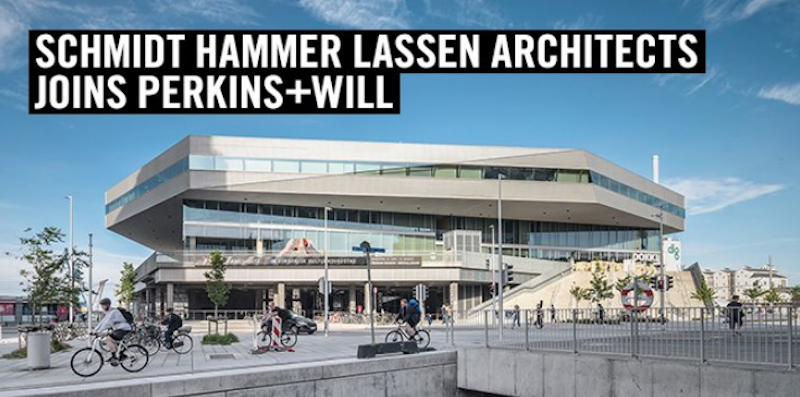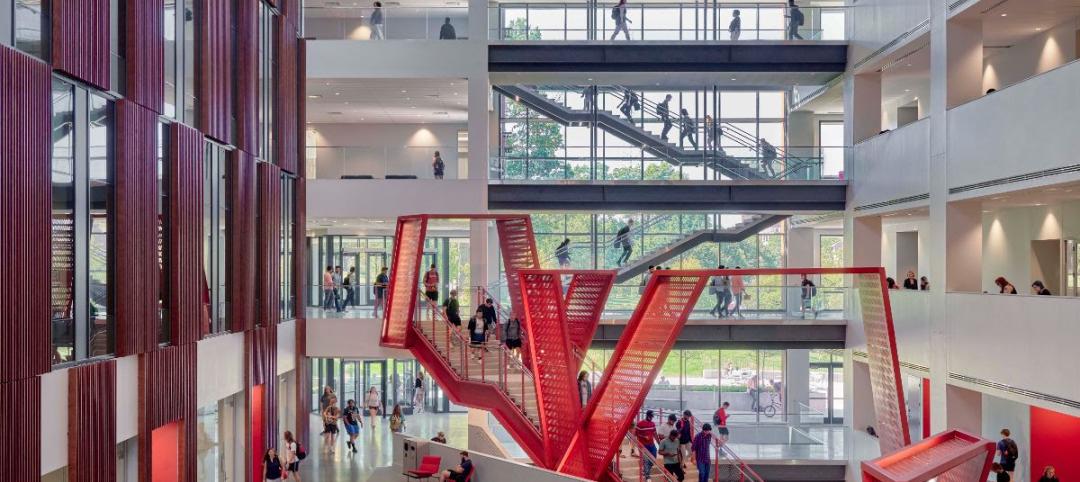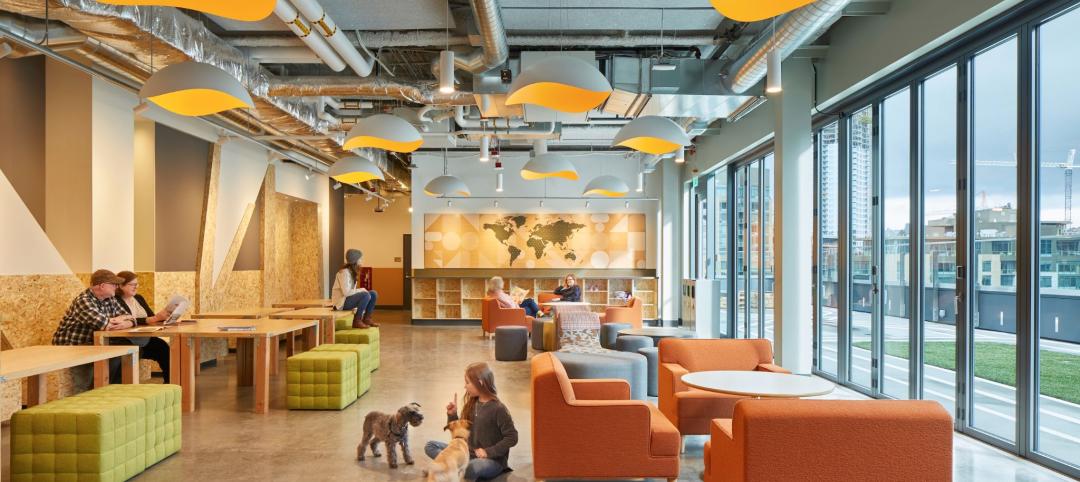One of Scandinavia’s most recognized design firms, Schmidt Hammer Lassen Architects, has joined global architecture firm Perkins+Will in a strategic partnership that extends Schmidt Hammer Lassen’s international reach and reinforces Perkins+Will’s commitment to sustainability and design excellence.
Founded in 1986, Schmidt Hammer Lassen is known around the world for its iconic, highly sustainable cultural and civic architecture, including The Black Diamond, the extension to the Royal Library in Copenhagen; ARoS Museum of Art in Aarhus, Denmark’s second-largest city; Halifax Central Library in Nova Scotia, Canada; the Katuaq Cultural Centre in Nuuk, Greenland; and the International Criminal Court in The Hague. The firm recently won a global competition to design the world’s largest library—the 1.2 million-square-foot Shanghai East Library—and it is currently working on the transformative Monroe Blocks mixed-use development in Detroit, Michigan, the firm’s first project in the United States.
By combining Perkins+Will’s 83-year legacy of design excellence with Schmidt Hammer Lassen’s illustrious Danish design pedigree, the united firms will make even greater contributions to the canon of cultural and civic architecture, according to Perkins+Will CEO Phil Harrison.
“Part of what makes this partnership so special is that Perkins+Will and Schmidt Hammer Lassen share a common set of values: design excellence, sustainability, innovation, and the highest level of client service,” Harrison says. “We also maintain the same design ethos, believing that exceptional architecture is always democratic and in the service of the greater good. We’re compatible at every level.”
Bjarne Hammer, founding partner of Schmidt Hammer Lassen, agrees:
“Our firms share a clear mission: through architecture and design, we make a positive difference in the world and in the lives of others. We both believe strongly in the transformative, healing power of design to address some of the most pressing social and environmental issues of our time. And, we both thrive in a design culture that encourages collaboration.”
Complementary Goals
In addition to a shared vision and purpose, the two firms have symbiotic market strategies. Perkins+Will aims to diversify its global talent, expand its cultural and civic practice, and reinforce the caliber of its design portfolio. At the same time, Schmidt Hammer Lassen aims to expand into new geographic markets, grow its client base, and apply groundbreaking design research to practice.
“We want to be known as a company that is both design-driven and client-focused, as a firm that produces extraordinary designs and delivers them with extraordinary efficiency. Merging with Perkins+Will enables us to maintain this critical part of our identity while having the support, technology, and reach of a much larger organization,” says Schmidt Hammer Lassen CEO Bente Damgaard. “It’s a fantastic opportunity.”
Perkins+Will’s global platform also provides a host of benefits to Schmidt Hammer Lassen’s international clients, Damgaard says, because they now have all of the resources, talent, and expertise—including research—they need within a single firm. This streamlines collaboration, facilitates communication, and ensures smooth project delivery.
Aligned In Design
The union of Perkins+Will and Schmidt Hammer Lassen is supported in large part by both firms’ legacies of, and commitments to, design excellence.
Over the last eight decades, Perkins+Will’s landmark projects of beautiful, thoughtful design—like the transformative Rush University Medical Center in Chicago, Illinois; the Shanghai Natural History Museum in China; and the Albion Library in Toronto, Canada—have characterized the essence of the firm. Similarly, Schmidt Hammer Lassen’s portfolio of award-winning architecture—projects that constitute works of public art in and of themselves—underscores the firm’s 32-year history of distinguished design. Examples of built work include Dokk1, the largest public library in Scandinavia; Malmö Live, a concert, congress, and hotel complex in Sweden; and Vendsyssel Theatre in Denmark, a music and theater hall that celebrates cultural exchange.
“Our firm is unequivocally rooted in Scandinavian architectural traditions, which are based on values like democracy, welfare, sustainability, light, openness, and social responsibility,” says Kristian Lars Ahlmark, senior partner at Schmidt Hammer Lassen. “Our buildings not only reflect these values, but they also impart these values on all who encounter them, whether tenants, visitors, or passersby.”
Synergies in Sustainability
Additionally, both Schmidt Hammer Lassen and Perkins+Will are known leaders in sustainability. Through their high-performing, environmentally responsive designs, the firms contribute significantly to the reduction of greenhouse gas emissions that cause climate change, and to the improvement of human and ecological health. The firms have designed hundreds of projects—collectively amounting to several hundred million square feet—that meet or surpass various international standards for green building. And their staff include many of the industry’s most sought-after experts in sustainable design.
“Sustainability is in our DNA at both Perkins+Will and Schmidt Hammer Lassen,” says Damgaard. “It’s just another example of the synergy between our firms—and of why this partnership makes sense.”
Cultural Diversity
The partnership is also a celebration of differences in culture, customs, language, and heritage—and of the design innovation that occurs when those differences interplay.
“Both of our firms believe in the global diversification of talent and creativity,” says Harrison. “We see the coming together of design cultures, aesthetics, and sensibilities as a positive force that leads to better, more thoughtful, more inclusive architecture. At Perkins+Will, we appreciate and celebrate Schmidt Hammer Lassen’s Danish design legacy, and look forward to the many ways it will positively influence our collective body of work.”
Related Stories
University Buildings | Dec 5, 2023
The University of Cincinnati builds its largest classroom building to serve its largest college
The University of Cincinnati’s recently completed Clifton Court Hall unifies the school’s social science programs into a multidisciplinary research and education facility. The 185,400-sf structure is the university’s largest classroom building, serving its largest college, the College of Arts and Sciences.
MFPRO+ News | Dec 5, 2023
DOE's Zero Energy Ready Home Multifamily Version 2 released
The U.S. Department of Energy has released Zero Energy Ready Home Multifamily Version 2. The latest version of the certification program increases energy efficiency and performance levels, adds electric readiness, and makes compliance pathways and the certification process more consistent with the ENERGY STAR Multifamily New Construction (ESMFNC) program.
Architects | Dec 5, 2023
Populous celebrates its 40th anniversary with a photo exhibit of its works
The firm partnered with Getty Images to assemble more than 60 images, many capturing fan ardor.
Office Buildings | Dec 1, 2023
Amazon office building doubles as emergency housing for Seattle families
The unusual location for services of this kind serves over 300 people per day. Mary's Place spreads across eight of the office's floors—all designed by Graphite—testing the status quo for its experimental approach to homelessness support.
Mixed-Use | Nov 29, 2023
Mixed-use community benefits from city amenities and ‘micro units’
Salt Lake City, Utah, is home to a new mixed-use residential community that benefits from transit-oriented zoning and cleverly designed multifamily units.
Giants 400 | Nov 28, 2023
Top 100 Laboratory Design Firms for 2023
HDR, Flad Architects, DGA, Elkus Manfredi Architects, and Gensler top BD+C's ranking of the nation's largest laboratory architecture and architecture/engineering (AE) firms for 2023, as reported in Building Design+Construction's 2023 Giants 400 Report.
Engineers | Nov 27, 2023
Kimley-Horn eliminates the guesswork of electric vehicle charger site selection
Private businesses and governments can now choose their new electric vehicle (EV) charger locations with data-driven precision. Kimley-Horn, the national engineering, planning, and design consulting firm, today launched TREDLite EV, a cloud-based tool that helps organizations develop and optimize their EV charger deployment strategies based on the organization’s unique priorities.
Market Data | Nov 27, 2023
Number of employees returning to the office varies significantly by city
While the return-to-the-office trend is felt across the country, the percentage of employees moving back to their offices varies significantly according to geography, according to Eptura’s Q3 Workplace Index.
Resiliency | Nov 27, 2023
All levels of government need to act to cope with climate-driven flooding and sea level rise
The latest National Climate Assessment highlights the need for local, state, and federal governments to adopt policies to mitigate the effects of climate-driven flooding and sea level rise, according to a policy expert with the National Resources Defense Council.
Data Centers | Nov 22, 2023
How is artificial intelligence impacting data center design?
As AI is reshaping how we interact with machines and the world around us, the design of data centers needs to adapt to this fast-changing landscape. So, Page pairs expert thinking with high-performing solutions to meet the needs of rapidly advancing technologies.

















